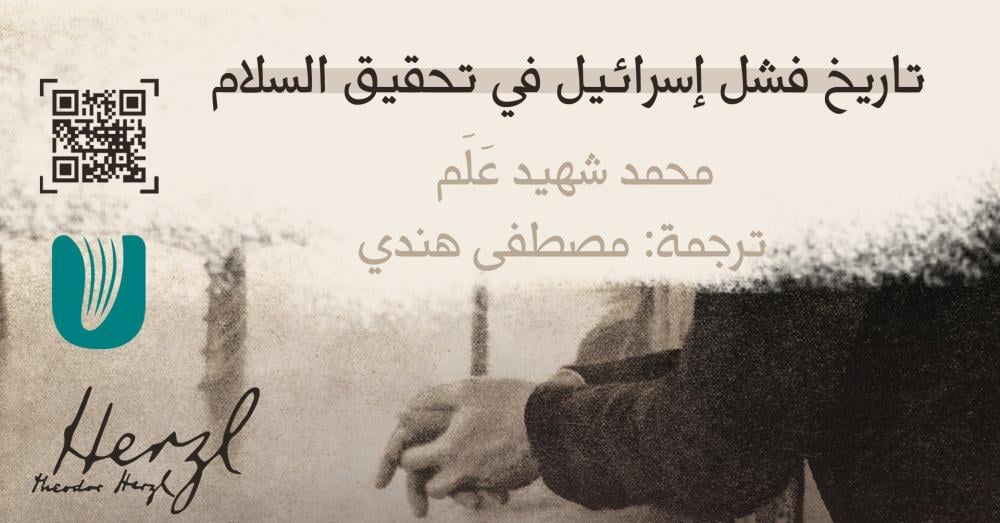The history of Israel's failure to achieve peace!
Muhammad Shahid Alam
Translated by: Mustafa Hindi
“ From the first moment, the State of Israel had timed explosives planted in the foundations of its building. These explosives are the complaints of hundreds of thousands of displaced Arabs .”
Isaac Deutscher , 1954 ( [1] )
“Shouldn’t these [Palestinians] who were evacuated keep their peace and calmly accept what happened to them? Will they stop trying to take back what was forcefully taken from them? And who knows, if they don’t stop, they will become the plaintiffs and judges.”
Isaac Epstein ( Yitzhak Epstein ), 1907 ( [1] )
“As for the war against the Jews in Palestine... it was clear twenty years ago that the day would come when the Arabs would stand against us.”
Ahad Ha'am , 1911 ( [2] )
“The question is: Do we dare to invade Palestine now with iron and fire, as Joshua did in his time?”
Judah L. Magnes , 1929 ( [3] )
“Historical logic predicts the eventual disintegration of the Jewish state; the forces around us are so great, the will to annihilate us so strong, and our chances of survival so slim.”
Benny Morris , 2008 ( [4] )
Few Zionists deny the escalating violence that helped build Jewish settler enclaves in the Middle East, but they often draw the world's attention to the fact that Arabs are the source of this violence because of their rejection of Israel. Moreover, Arab rejection of Israel is rooted in their ancient religious hostility against Jews.
The Zionist movement in Palestine generated deep-rooted violence between Jewish and Palestinian settlers; Since 1948, this violence has often pitted Israel against the Palestinians and its Arab neighbors; It has often drawn Western societies - especially the United States - into expanding and deepening conflicts with the Islamic world, and the thesis of this chapter - and indeed this book - shows that the history of these ever-escalating cycles of conflict and instability is an essential component of the Zionist idea itself. Instability and violence are an integral part of Zionism. It flows from her internal logic, and is not just an incidental feature of her.
It may surprise you to learn that few of the early Zionists warned of the destructive and destabilizing consequences of their occupation project. They could not ignore the grave dangers inherent in the Zionist project when Palestinian resistance began against the occupation of their lands, and this began early. However, the Zionists preferred to dismiss these concerns, convinced that the “natives” lacked the will, organization, and resources necessary to spoil the Jewish plan, and they engaged in They had intense and focused discussions about their occupation project - and specifically about how to make it successful - but they did not develop a “coherent theory of dealing with the Arabs” that objectively evaluated the Arab reaction to Zionism, or how to deal with it, and perhaps they felt that this was unnecessary. Yitzhak Epstein wrote in 1907: “It is a shame that this has not been done hitherto; nothing has ever been advanced in this regard [the question of the Jewish attitude towards the Arabs]; so far not a single Jew has devoted himself to the study of this subject, so that we Completely illiterate about anything related to the Arabs, all our knowledge of them is folk wisdom” ( [5] ) , and the early Zionists believed - according to the article Ahad Ha’am in 1891 - that “all Arabs... “They are nothing but a group of savage Bedouins who live like animals and do not understand what is happening around them” ( [6] ) . Why do we worry about these “savages”? Certainly they would be swept away by the astonishing civilizational progress that Jewish settlers were bringing to the region. On other occasions - when the Zionists became aware of initial Arab resistance - they preferred to ignore their concerns with mere wishful thinking; They considered that Palestinian resistance would be fleeting; Once they begin to reap the benefits of Jewish occupation - from rising land prices and new job opportunities - they will not hesitate to welcome the settlers ( [7] ) .
The Zionists, in general, wanted to believe that the Palestinians were not a people, had no attachment to their land, no national identity, and no national aspirations; Then we can take their land from them, and the irony in all this is clear; The Jews - who were not yet a people; Because they do not have land that they can claim as their own, they assert that the Palestinians - who have their own land - are not a people. This crude deception has only one end; A people without land can steal another people's land.
The Zionists tried to pursue a diplomatic solution to overcome the Palestinian resistance; They asked for help from the emerging Arab nationalists who were dreaming of restoring their glorious heritage from the Abbasid era, and they bargained with them to sacrifice Palestine in exchange for promoting the Arab cause in the forums of the great powers. The sacrifice would be small for the sake of a higher goal, which is the establishment of an Arab kingdom extending from Morocco to Iraq, and the Zionists made clear to the nationalists Arabs believe that the historical centers of Arab civilization are located in Baghdad, Damascus and Cairo, not in Jerusalem. So why do Arabs complain about losing Jerusalem if this will fulfill their dream of restoring the ancient Arab Empire? ( [8] ) , and the Zionists’ first efforts met with some success. At the Versailles Conference in 1919, Chaim Weizmann convinced Prince Faisal - the main leader of the Arab Revolt against the Ottomans - to cede Palestine to the Zionists; When he was forced to confront Arab anger towards this concession of Islamic lands, Prince Faisal made his agreement with the Zionists conditional on the establishment of the Arab Kingdom that he and his family sought ( [9] ) . This conditional agreement was short-lived, as the Prince broke his deal with the Zionists, yielding to the pressure of the Arab nationalists. .
The Zionists were unable to cling to their fantasy of establishing a Jewish state in Palestine without violence. The first stab at this fantasy came from the right wing of the Zionist movement. Ze'ev Jabotinsky - in his article in which he laid the foundations of the new Zionist movement in 1923 - rejected the narrative that the Palestinians would voluntarily give up their historical rights in Palestine, and wrote that The Arabs "will resist foreign settlers as long as they have a glimmer of hope in preventing 'Palestine' from becoming the Land of Israel." Jabotinsky saw that a change in the declared Zionist strategy was inevitable, and the Zionists would have to - in order to win - extinguish the Arab "ray of hope"; If the Zionists cannot buy the consent of the Arabs, their defeat is inevitable, and the settlement process will continue - in the words of Jabotinsky - “under the protection of a force that does not depend on the consent of the local population, and they will be placed behind an iron wall that they will be unable to destroy” ( [10] ) , and what Jabotinsky did It is that he brought out into the open what had always been implicit in the Zionist idea - and certainly in the thinking of the Zionist leadership, for despite their declared position, they always knew what Jabotinsky was calling for to acknowledge publicly.
For Zionism, the use of violence against the Palestinians was not an alternative plan to be resorted to when needed. Rather, it was the only option likely to succeed. The Zionists were always ready to confront the Palestinians. With or without British support, in secret or in public, when the opportunity came in 1948 the Zionists achieved their goals almost completely; They defeated the armies of five primitive Arab countries, and established a Jewish state in 78% of Palestine after expelling most of its Arab residents. They also seized - in October 1956 - the Sinai in a lightning strike, taking advantage of British and French planning to seize the Suez Canal, and in the June 1967 war. Israel inflicted a crushing defeat on three Arab armies, and occupied the rest of Palestine, Sinai, and the Golan Heights; In the process, its area quadrupled, and this was less than twenty years after its establishment. Most importantly, they dealt a painful blow to the illusions and promises of Arab nationalism, which was supposed to be at the height of its strength, and the Arab nationalists have most likely never recovered from this disgrace. never.
But despite these resounding successes, Israel failed to achieve normal life for its residents. Is it possible that the Israelis did not pursue the dream of a normal life because it did not serve their interests?
Many Israelis now openly admit that something has gotten out of control and is no longer going as planned; The Israelis engaged in two massive rounds of ethnic cleansing in 1948 and 1967, and repeatedly defeated the Arabs in military confrontations in 1948, 1956, 1967, and 1973. The Jewish population in Israel has increased more than eight-fold since the founding of the occupying entity in 1948. They demonstrated their ability to attack Arab targets in the West Bank, Gaza, Iraq, Syria, Lebanon, and Tunisia with impunity. They also obtained unconditional American support for their occupation project in the West Bank and Gaza Strip, and they continue to strangle the Palestinians in these areas ( [11] ) , and they designed the largest financial and military support Continuing from one country to another in history, they have one of the most powerful armies in the world, equipped with modern weapons from the United States arsenal. They also control nuclear weapons, and a fleet of submarines capable of launching ballistic missiles, and they enjoy unconditional support from the Jewish diaspora, which is stronger and more more organized than ever. For many years, Israel has been pushing the Arabs to the brink and they are ready to recognize Israel and bargain for peace. However, the Zionists have rejected this offer - with contempt - time and time again. With these enormous advantages over the Arabs, the Israelis want more, and seek for Israel to be the only country that... It has military capabilities in the region, and it seems that the Israelis will not feel safe at all unless the Arabs dismantle the military arms of their countries.
Israelis fear peace much more than they fear war; Peace with the Arabs would destroy their tireless efforts to prove that they were the most important “ally and strategic asset” of the United States. The Israelis did not feel safe in the place they dreamed of as a safe haven for the Jews of the world. At the same time, Israel must still be freed from almost complete dependence on Western powers. Despite their restrictions on the Palestinians, the Zionists failed to extinguish the Palestinian “ray of hope.” When the Israelis chose the secular Palestine Liberation Organization and assigned it the political administration of the West Bank and Gaza Strip, it carried Hamas - the most radical - is the banner of the Palestinian struggle, and the groups more active than Hamas are waiting for an opportunity, and are ready to replace it if its resolve weakens under the Israeli siege. Therefore, the Israelis do not see an end in sight to their state of anomaly, as their future is still fraught with dangers.
Why did Israel's victories - and no one questions the magnitude of these achievements - fail to inspire confidence in its ability to survive in the long term? Why do Arab societies continue to deprive Israel of the “right to exist”?
Israel is still engaged in the destruction of its neighbors, more than six decades after its establishment - six decades of impressive military, territorial, demographic and economic gains - and is trying to beautify its destructive nature under the ostensible pretext of establishing security, but its real goal is to eliminate the last pockets of resistance against its hegemony. It is determined to redraw the map of the Middle East, and is determined to transform the current countries into small, non-sovereign states, more dependent than the oligarchies in Israel’s dependence on Western powers for their survival. Israel is now established - after defeating almost all of its Arab opponents. After a successful campaign to push the United States to invade and occupy Iraq, and after the destruction of Lebanon in a new war in July 2006, he urged the United States to launch the war machine against Iran, and to use nuclear weapons - if necessary - to destroy its nuclear facilities. Israel also continues its policy of ethnic cleansing. Against the Palestinians slowly, and all the while preparing to begin a final round of ethnic cleansing to finish the mission it began in 1948, people everywhere - except the United States - view Israel as an oppressive and racist state, and the sponsor of apartheid in the world. As Hugo Bergmann, a young Jewish philosopher from Prague, said in 1919, the Jews built their state by betraying Jewish ideals ( [12] ) .
In short, the creation of Israel did not address the “Jewish question,” and nothing changed except its location, form, and name. Europeans have long wrestled with what they call the “Jewish question.” Perhaps the Nazis and Zionists succeeded - unwittingly - in transforming the “Jewish question” into the “Zionist question.” Because of this transformation, the global “Zionist question” has now replaced the European “Jewish question,” and the world is now waiting - with great patience - for Israel to make its next move. the mission; He anxiously anticipates that its next major move will be driven by the spirit of humanity, not megalomania; Which means that it will recognize the rights of all Palestinians; The wrongs committed against them will be redressed in the same spirit in which the Jews sought and obtained reparations for the wrongs committed against them by the Nazis. However, no one - based on a sober assessment of the Israeli record - expects Israel - any time soon - to be prepared to provide this kind. Of the historic concessions that dismantled apartheid in South Africa, and led blacks and whites in those countries towards reconciliation and peace, some may argue that Israel has passed the point at which it can make such profound concessions; It has fallen into the trap of its destructive logic, and the dream of removing the use of force from the equation for solving its problems has become a nightmare, and time - alone - is what will determine whether hope or despair will prevail, and whether Israel will choose the path of reason or commit the same grave mistakes on the path of war.
-------------------------------------------------- ---------
[1] - Marxist historian Isaac Deutscher (1907–1967) was born in Poland in 1907, and moved to England in 1939, where he worked for The Economist and The Observer newspapers. Look:
Deutscher, “Israel's Spiritual Climate,” 30.
[1] -Shatz, Prophets Outcast, 40.
[2] - Ahad Ha'am wrote - after a visit to Palestine in 1891 - that the Jewish settlers “treat the Arabs with hostility and cruelty, deprive them of their rights, and abuse them without cause. Rather, they are proud of these actions, and none of us opposes this despicable method.” "And the vile":
Rejwan, Israel in Search of Identity, 9.
[3] -Kushner and Solomon, Wrestling Zion , 18.
[4] -Horowitz, “Editor’s Notes.”
[5] -Shatz, Prophets Outcast , 51.
[6] - In a letter to Chaim Weizmann, Judah Magnes complained that “unfortunately, nearly half of the Arabs of Palestine are still rabble, and their leaders are weak-minded.” Look:
Kushner and Solomon, Wrestling Zion, 18.
[7] -Rejwan, Israel in Search of Identity, 7
Many Zionists - starting with Theodor Herzl - followed this approach, trying to influence the Arabs or Ottomans by sweet talk about the invaluable benefits that Zionism would bring them if they handed Palestine over to Jewish occupation. This is the approach that adults take towards children when trying to persuade them to make a losing trade-off or force it on them. The best example of this apparently naive approach is provided by Isaac Epstein. Although he recognized the dangers of violating the rights of Palestinians, he wrote, “These two people - the Hebrew and the Arab - can - To compensate for each other's shortcomings, because what we can give to the Arabs they cannot get from any other people. Every nation that comes to Syria under the guise of an economic savior will seek conquest, subjugation, and tyranny, and this is not what we are seeking Warships, we are innocent, we are not obsessed with thinking about oppressing and dismantling the national identity of our neighbors; and with a pure heart, we come to settle among them in order to improve their situation in all respects.” As late as 1930 - after the Arab Revolt of 1929 - Albert Einstein could have written: “I am convinced that the dedication and devotion of the Jewish people to Palestine will benefit the entire population of the country, not only materially, but also culturally and nationally”:
Shatz, Prophets Outcast, 48, 62.
[8] -Rejwan, Israel in Search of Identity , 14–20.
[9] -Rodinson, Israel , 54.
[10] -Shlaim, The Iron Wall , 13.
[11] - In 2005, Israel evacuated Jewish settlers from Gaza, and continued to monitor its borders and beaches in cooperation with Egypt, which led to a tightening pressure on the residents of Gaza.
[12] -Rejwan, Israel in Search of Identity , 11.


